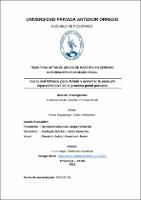Mostrar el registro sencillo del ítem
Juicio oral bifásico para debatir y acreditar la pena y/o reparación civil en el proceso penal peruano
| dc.contributor.advisor | Cruz Vegas, Guillermo Alexander | |
| dc.contributor.author | Reyes Sagástegui, Robert Alexander | |
| dc.creator | Reyes Sagástegui, Robert Alexander | |
| dc.date.accessioned | 2023-09-21T17:03:28Z | |
| dc.date.available | 2023-09-21T17:03:28Z | |
| dc.date.issued | 2023 | |
| dc.identifier.uri | https://hdl.handle.net/20.500.12759/11200 | |
| dc.description.abstract | La presente investigación nace de la preocupación de que en el Perú el juicio oral, que es catalogado la etapa principal del proceso penal común, sea único, lo cual limita la posibilidad que tanto el juicio de culpabilidad y el juicio respecto a la determinación de la pena y/o al reparación civil se vean limitados, en ese contexto es que se propone la necesidad de que se regule de forma expresa tal y como sucede en el derecho comparado la división del juzgamiento en dos fases, de forma tal que se determine primero el denominado juicio de certeza y luego la consecuencia jurídica que pueda derivar del delito o del hecho típico en el proceso penal. De lo dicho en el párrafo precedente, a lo largo de la investigación se ha revisado y analizado la legislación internacional y se ha podido advertir con claridad que varios de los países que cuentan con un proceso penal acusatorio, dividen el juzgamiento en esas dos fases; además de ello, la doctrina internacional y también la doctrina nacional se han mostrado favorables a esta posibilidad, ya que inclusive así haya más demora en el juicio, esta forma de proceder en el juicio a partir de dos sub etapas sería mucho más garantista en aras de conseguir una sentencia justa y coherente con los derechos del acusado. Sin embargo, además de lo destacado por la doctrina y el derecho comparado sobre los beneficios que traería dividir el juicio oral en dos partes, se ha logrado aquí establecer, en virtud del sistema procesal penal peruano respecto a lo señalado en el artículo 12 inciso 3 del Código Procesal Penal advertir, que la división del juzgamiento oral, no solo debe darse, como la mayoría sostiene: cuando haya declaratoria de culpabilidad, sino que también se debe abrir un espacio procesal para discutir la reparación civil en casos de absolución. | es_PE |
| dc.description.abstract | The present investigation arises from the concern that in Peru the oral trial, which is classified as the main stage of the common criminal process, is unique, which limits the possibility that both the guilty trial and the trial regarding the determination of the penalty and/or civil compensation is limited, in this context it is proposed that the division of the trial into two phases be expressly regulated, as happens in comparative law, in such a way that it is determined first the so-called trial of certainty and then the legal consequence that may derive from the crime or from the typical fact in criminal proceedings. From what was said in the preceding paragraph, throughout the investigation international legislation has been reviewed and analyzed and it has been possible to clearly see that several of the countries that have criminal accusatory proceedings divide the trial into these two phases; In addition, international doctrine and also national doctrine have been favorable to this possibility, and even if there is more delay in the trial, this way of proceeding in the trial from two sub-stages would be much more guaranteeing in order to achieve a fair sentence consistent with the rights of the accused. However, in addition to what is highlighted by the doctrine and comparative law on the benefits that dividing the oral trial into two parts would bring, it has been established here, by virtue of the Peruvian criminal procedure system with respect to those indicated in article 12 paragraph 3 of the Code of Criminal Procedure to warn that the division of the oral trial should not only occur, as the majority maintains: when there is a declaration of guilt, but that a procedural space should also be opened to discuss civil reparations in cases of acquittal. | en_US |
| dc.description.uri | Tesis | es_PE |
| dc.format | application/pdf | es_PE |
| dc.language.iso | spa | es_PE |
| dc.publisher | Universidad Privada Antenor Orrego | es_PE |
| dc.relation.ispartofseries | M_DERE_222 | |
| dc.rights | info:eu-repo/semantics/openAccess | es_PE |
| dc.rights.uri | https://creativecommons.org/licenses/by/4.0/ | es_PE |
| dc.source | Universidad Privada Antenor Orrego | es_PE |
| dc.source | Repositorio institucional - UPAO | es_PE |
| dc.subject | Juzgamiento en dos fases | es_PE |
| dc.subject | Sanción penal | es_PE |
| dc.title | Juicio oral bifásico para debatir y acreditar la pena y/o reparación civil en el proceso penal peruano | es_PE |
| dc.type | info:eu-repo/semantics/masterThesis | es_PE |
| thesis.degree.grantor | Universidad Privada Antenor Orrego. Escuela de Postgrado | es_PE |
| thesis.degree.name | Maestro en Derecho Penal | es_PE |
| thesis.degree.discipline | Maestría en Derecho | es_PE |
| dc.subject.ocde | http://purl.org/pe-repo/ocde/ford#5.05.02 | es_PE |
| renati.advisor.orcid | https://orcid.org/0000-0002-9119-5397 | es_PE |
| renati.author.dni | 48003208 | |
| renati.advisor.dni | 43414679 | |
| renati.type | http://purl.org/pe-repo/renati/type#tesis | es_PE |
| renati.level | http://purl.org/pe-repo/renati/level#maestro | es_PE |
| renati.discipline | 421357 | es_PE |
| renati.juror | Seminario Mauricio, Jorge Fernando | |
| renati.juror | Carbajal Sánchez, Henry Armando | |
| renati.juror | Mauricio Juárez, Francisco Javier | |
| dc.publisher.country | PE | es_PE |




